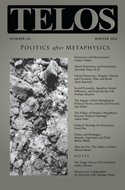Andrea Salvatore’s “The Tragic Theory of Carl Schmitt” appears in Telos 161 (Winter 2012). Read the full version online at the Telos Online website, or purchase a print copy of the issue in our store.
 The present note aims to suggest a tragic reading of Carl Schmitt’s thought within a post-metaphysical perspective. The argument is divided into two parts. In the first—the meaning of the tragic dimension—I deal with Schmitt as a theorist of the tragic, that is, with the concept of tragedy that can be induced from Schmitt’s philosophy as a unitary whole. In the second part—the actuality of the tragic era—I will consider Schmitt as a pathologist of the tragic, by summarizing the diagnosis of the modernity he explicitly points out in his major works. The first thesis states that any normative and/or political order constitutively depends on a fundamental set of factual pre-conditions, whose actual enforcement in turn depends on a contextual and epochal contingency, beyond human control. If so, the range of human agency is determined by a super-human contextual contingency, to such an extent that we have to abandon the illusion of being able to decide everything. The second thesis states that the contemporary era is irretrievably characterized by a set of factual pre-conditions that makes any ultimate decision and political order unfeasible. If so, late modernity’s contingency is determined by the lack of any ordering principle and foundational reality, with the consequence that we have to abandon the illusion of being able to decide something. The awareness of the vital necessity of something lacking, and still impossible to restore, marks the tragic character of Schmitt’s thought considered in its consistent whole.
The present note aims to suggest a tragic reading of Carl Schmitt’s thought within a post-metaphysical perspective. The argument is divided into two parts. In the first—the meaning of the tragic dimension—I deal with Schmitt as a theorist of the tragic, that is, with the concept of tragedy that can be induced from Schmitt’s philosophy as a unitary whole. In the second part—the actuality of the tragic era—I will consider Schmitt as a pathologist of the tragic, by summarizing the diagnosis of the modernity he explicitly points out in his major works. The first thesis states that any normative and/or political order constitutively depends on a fundamental set of factual pre-conditions, whose actual enforcement in turn depends on a contextual and epochal contingency, beyond human control. If so, the range of human agency is determined by a super-human contextual contingency, to such an extent that we have to abandon the illusion of being able to decide everything. The second thesis states that the contemporary era is irretrievably characterized by a set of factual pre-conditions that makes any ultimate decision and political order unfeasible. If so, late modernity’s contingency is determined by the lack of any ordering principle and foundational reality, with the consequence that we have to abandon the illusion of being able to decide something. The awareness of the vital necessity of something lacking, and still impossible to restore, marks the tragic character of Schmitt’s thought considered in its consistent whole.


